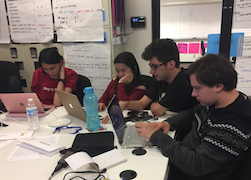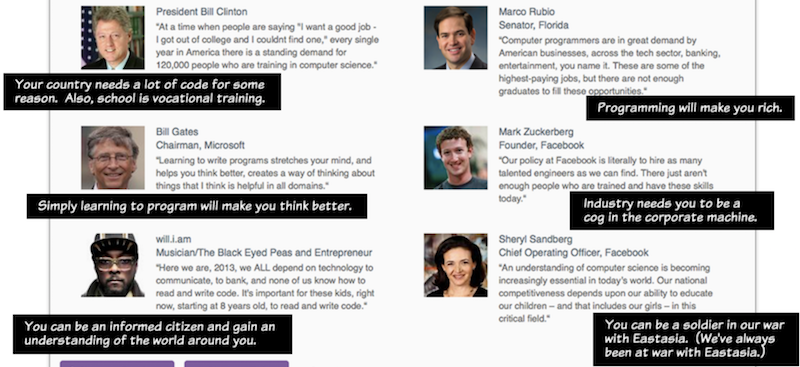Learning Programming

Learn to Code, or Learn Computer Science?
What do you care about: learning programming as a hobby, or a trade? Do you want to learn to think? Do you want to get into a tech business and do project management, working with developers? Do you want to learn real computer science? Should everyone?
What does it even mean to “learn to code”?
There are a lot of opinions out there. And some disagreements too! Here’s a sampling:
- Yevgeniy Brikman’s Don’t just learn to code, learn how to think
- Jeff Atwood’s Please don’t learn to code
- Tami Reiss’s Why I won’t learn to code, and you shouldn’t either
- Chris Granger’s Coding is not the new literacy
- Basel Farag’s Please don’t learn to code
- Thorne Melcher’s Maybe Don’t Learn to Code
- Quincy Larson’s Please Do Learn to Code
Why Learn?
Now it’s true that many people think you should learn to code for the wrong reasons. Here’s a sampling of some dumb (or just off-the-mark) reasons, together with one from will.i.am that’s not half bad!

How’s this for a reason?
We teach math and natural sciences so that children have a sense of agency in the world. We need to teach computing for the same reason.
Simon Peyton-Jones #strangelooppic.twitter.com/XlKqRO6z2xmdash; Jessica Kerr (@jessitron) September 27, 2018
What You Will Need
If you do decide to “learn to code,” there are a couple points from Mark Guzdial’s article Anyone Can Learn Programming worth noting:
- You’ll want a growth mindset (I can succeed with dedication and hard work) as opposed to a fixed mindset (My abilities are set at birth and I’ll never get good at this); and
- Plain old practice is not the same as deliberate practice. Guzdial writes, “Deliberate practice leads to expertise, and deliberate practice is facilitated by good teaching.”
Keep in mind, too, that learning programming is hard and takes time and effort. You will run into other people that are way ahead of you but who’s to say you won’t get there? It might seem daunting, right? You might have hear about those folks that appear to ten times more productive than everyone else (the so-called 10x developers). Should you be in awe of them? Wellllllll, Jessica Kerr says, correctly, that most of the time, the reason for hyperproductivity is not what you think.
Also, watch out for Impostor Syndrome.
Imposter Syndrome: be honest with yourself about what you know and have accomplished & focus less on the difference. pic.twitter.com/VTjS5KdR6Y
— 🅳🅰🆅🅸🅳 🆆🅷🅸🆃🆃🅰🅺🅴🆁 (@rundavidrun) April 13, 2015
And watch out for Stereotype Threat as well. These things can get in the way of learning.
Where Can I Learn to Program?
There are many tutorials, walkthroughs, academies, and online universities out on the web that aim to teach you the basics of programming. A few have gotten quite popular:
- Codecademy
- Code.org
- freeCodeCamp
- Khan Academy Computer Programming
- This list of “Anyone can code” sites from a TED Blog
The Modern JavaScript Tutorial is good.
Marijn Haverbeke’s Eloquent JavaScript is a wonderful online, interactive book. You can code right inside the book.
Or try a class from Coursera, Udacity, Udemy, or edX.
Or a traditional university. Or friends and mentors.
Here’s a good one: Dan Shiffman’s video series Code!. Here’s the trailer:
Check out the entire video series (as a YouTube Playlist).
DevelopersForHire has a great guide for aspiring women developers.
What Makes a Good Learning Environment?
Time for a brief field trip! Khan Academy introduced a computer programming section back in 2012. Their Introduction to JavaScript: Drawing and Animationcourse goes through the following topics:
- Intro to Programming
- Drawing Basics
- Coloring
- Variables
- Animation Basics
- Interactive Programs
- Text and Strings
- Functions
- Logic and If Statements
- Debugging Programs
- Looping
- Writing Clean Code
- Arrays
- Objects
- Object-Oriented Design
- Becoming a Better Programmer
There are quite a few good things:
- Programming is live; things happen as you type.
- Numeric values and color can be scrubbed!
- Documentation is right under your coding canvas.
But there are some pretty big drawbacks:
- The dialect of JavaScript used is unfortunately old (and makes it a non-starter for many). Keep this in mind if you choose to work through the examples on the site. Many legal JavaScript programs will not work in KA, and in fact KA will tell you that you have an error, but it is their fault, not yours. If you use KA, you must stick to the restricted subset of JavaScript that it understands.
- They are a bit too picky in deciding which code is good and which is not (they flag as errors things that are legal JavaScript).
- Their teaching style seems to encourage experimentation. There’s nothing necessarily wrong with that, but please do not think that this experimentation-style is the only, or best, way to learn. Playing around in an unstructured way is sometimes nice, and leads to wonderful a-ha moments of discovery! But it can also lead you to miss things, pick up bad habits, form inconsistent hypotheses, and even get stuck and disillusioned. You’re best off following a well-designed curriculum, and playing around just a little from time to time. If you are guided by an instructor or mentor, even better.
- You are struck drawing on a canvas that is either 400x400 pixels, 500x500 pixels, or 600x600 pixels. Though constraints are where creativity comes from, I’m not sure this is a good constraint.
But what makes a good learning enviroment, in general? What should learners be aware of? Bret Victor has some thoughs. Please read (and interact with) his excellent essay. (To be fair, it addresses Khan Academy’s approach back in 2012, but the thrust of the essay remains timeless, and it’s not really just about KA anyway.) It is a long read, but powerful.

So What is Programming Anyway?
We didn’t forget to define the word “programming”; we just wanted to make sure we’ve seen enough code before attempting to do so. When studying programming, it’s a good idea to know what cetain words are referring to. These are pretty useful to know:
- Programming, also known as scripting or coding, is the act of creating instructions that an agent (someone or something) can carry out. You can program robots, computers, media players, consumer devices, drones, factory machinery, and more.
- An algorithm is the (abstract) set of instructions for solving a problem. An algorithm doesn’t get carried out on a machine, but a program does.
Don’t get too hung up on definitions
Language is fluid, of course, and a lot of people often misuse technical termninology. But it’s helpful to keep in mind the intent behind these terms. Don’t be a jerk whencorrectingreminding people of subtle differences in wording.
Actually, there’s more to study that boring definitions. We need quotes! Browse the Wikiquote page on programming for some good and bad and sometimes humorous takes.
A Parting Shot, But An Important One
Remember that programming is not an end in itself. Computers should be used to amplify human thinking. Simply programming does not make you a better thinker.
...children can learn to program and that learning to program can affect the way they learn everything else. I had in mind something like the process of re-empowerment of probability: the ability to program would allow a student to learn and use powerful forms of probabilistic ideas. It did not occur to me that anyone could possibly take my statement to mean that learning to program would in itself have consequences for how children learn and think.
— Seymour Papert
Summary
We’ve covered:
- A bit about what people mean when they say “learn to code”
- Good (and bad) reasons for learning to program
- Growth vs. fixed mindsets
- Impostor syndrome
- Where you can learn to program
- Some good and bad things about Khan Academy’s approach to programming
- The difference between a program and an algorithm
- That learning to program does not magically change how you think